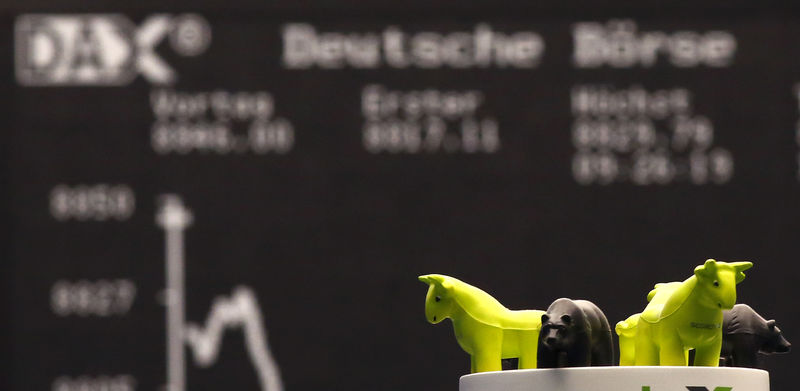By Peter Nurse
Investing.com - European stock markets are expected to open lower Monday, as a string of weak Chinese economic data releases points to a Covid-induced slowdown at one of the globe’s key growth engines.
At 2:05 AM ET (0605 GMT), the DAX futures contract in Germany traded 0.4% lower, CAC 40 futures in France dropped 0.5% and the FTSE 100 futures contract in the U.K. fell 0.5%.
European markets are set to suffer from the weak sentiment in Asia Monday after data released in China earlier in the day showed industrial production rose 6.4% year-on-year in July, and retail sales grew 8.5% year-on-year in the same month, both lower than expected.
This slowdown is the result of the second largest economy in the world tightening mobility restrictions to combat the spread of the highly-transmissible delta variant of the Covid-19 virus.
In neighboring Japan, the GDP grew 0.3% quarter-on-quarter and 1.3% year-on-year in the second quarter, avoiding a double-dip recession despite continued restrictions to contain the coronavirus.
Those restrictions are yet to have their desired effect. The Japanese Sankei newspaper reported Monday that Prime Minister Yoshihide Suga is poised to expand and extend for about another two weeks a virus state of emergency in Tokyo.
The collapse of the Afghan government after Taliban insurgents took over Kabul, the capital, has added to the negative sentiment.
Back in Europe, there is little in the way of tier one economic data due for release Monday.
In the corporate sector, HSBC (LON:HSBA) will likely be in the spotlight after Europe’s largest bank by assets agreed to acquire AXA's (PA:AXAF) insurance assets in Singapore for $575 million as it beefs up its insurance and wealth business.
HSBC said the combined business would be the seventh-largest life insurer and the fourth-largest retail health insurer.
Elsewhere, oil prices fell by over 1% Monday on concerns mobility restrictions in China, the second largest importer of crude in the world, will hit fuel demand.
China's daily crude throughput last month fell to the lowest since May 2020 as independent refiners slashed production, according to data from the National Bureau of Statistics on Monday. That was the first year-on-year decline since March last year when the coronavirus hit hard.
By 2:05 AM ET, U.S. crude futures traded 1.4% lower at $67.27 a barrel, while the Brent contract fell 1.3% to $69.66.
Additionally, gold futures fell 0.2% to $1,773.70/oz, while EUR/USD traded marginally lower at 1.1789.
